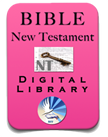Bible Study Questions
Titus 1:1-4
Called into His Service
Paul J. Bucknell
Paul, a bond-servant of God, and an apostle of Jesus Christ, for the faith of those chosen of God and the knowledge of the truth which is according to godliness, 2 in the hope of eternal life, which God, who cannot lie, promised long ages ago, 3 but at the proper time manifested, even His word, in the proclamation with which I was entrusted according to the commandment of God our Savior; to Titus, my true child in a common faith: Grace and peace from God the Father and Christ Jesus our Savior.
A. Our Personal Calling (Titus 1:1)
How God’s community is formed
“Paul, a bond-servant of God, and an apostle of Jesus Christ ( Titus 1:1, NASB).
Each Christian is a special design of God.
We excel only when we consecrate our lives to our Lord.
-
Who wrote the book of Titus? What does the name ‘Paul’ mean (look it up)? Look at 1 Timothy 1:15 and speculate why Paul might have adopted this new name.
-
What was Paul’s old name? Recall 7 facts about Paul’s former life and conversion.
- What does your name mean? Names are significant because there is a real person behind each one that God cares for. Share some special aspect of your life, perhaps your own conversion.
-
Altogether Paul uses three phrases to describe himself. His name is the first one. What are the two other phrases he uses to describe himself (1)?
-
Check other versions to see various translations for the second description. They come from the Greek word doulos. There is no difference between servant and slave in the Greek world even though there is in English. Who is he a slave to?
- Why would Paul use such a title to describe himself?
-
Would you use this term to describe yourself? Why or why not?
-
Paul lastly describes his special calling as an apostle. What does apostle mean? What does an apostle do?
-
Paul was very effective in his ministry partially because he was clear as to what God had for his life. What does God want to do through your life? As one of His children, we can be sure that every person has a calling, whether a Mom, Dad, single, all have our purpose. God works His purpose through each of us.
B. Our Corporate Mission (Titus 1:1-3)
“Paul, a bond-servant of God, and an apostle of Jesus Christ, for the faith of those chosen of God and the knowledge of the truth which is according to godliness, in the hope of eternal life, which God, who cannot lie, promised long ages ago, but at the proper time manifested, even His word, in the proclamation with which I was entrusted according to the commandment of God our Savior;” (Titus 1:1-3, NASB).
What God’s community exists for
Living out and proclaiming God’s truth influences how we do everything in life.
-
The word ‘mission’ describes the purpose for an individual and more commonly a group or organization. What two things summarized Paul’s mission or purpose for life (1)? (Note: See the word ‘for’ in verse 1).
-
What does it mean by ‘For the faith’? Put that in your own words. How would he help them in their faith?
-
Election (i.e. God chooses who is to be saved) is a tough issue for some. Why? Does verse 1 teach election? How so?
-
What is one valuable application of election to our lives?
-
The second purpose is to advance their ‘knowledge of the truth.’ How is this knowledge different from other kinds of knowledge? How is it valuable? Why is it so important to Paul?
-
Some people assert they believe in Christ but do not have Him as Lord. How can one use the phrase “truth according to godliness” to expose their false thinking?
-
What is eternal life? Where might this term originate? (Think back to the garden.)
-
What does verse 2 say about God? How does this affect the words God speaks? Are your words so reliable? Why or why not?
- List three Old Testament prophecies that were filled at the right time by Christ’s life and death (3).
C. Our Joint Task (Titus 1:4)
“to Titus, my true child in a common faith: Grace and peace from God the Father and Christ Jesus our Savior.” Titus 1:4, NASB.
How God’s community functions
We treasure carrying out God’s work
in cooperation with others and assist them as we are able.
-
Who did Paul write the Book of Titus to? What do we know of him through this verse (4)? If you have time, do a Bible search of his name and see what else you can find about him.
-
What kind of relationship do you think Paul had with Titus from what we read here?
-
Do those in authority always have a close relationship with those they work with? Why or why not?
-
Why is Paul writing to him (see 1:5)? Paul entrusted this work to Titus. Is it easy for you to share the work with others or do you have to do it in order “to get it done right”?
-
The Book of Titus was actually a letter to help Titus properly carry out his work. Have you trained anyone before? Who? What? Make sure you include different groups of people like at work, family, friends, church, etc.
-
How does training help people?
-
Have you ever been given something to do but not know how to do it?

